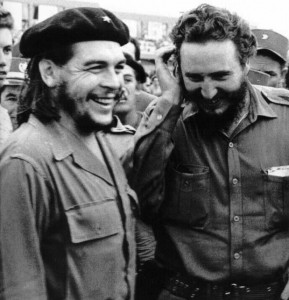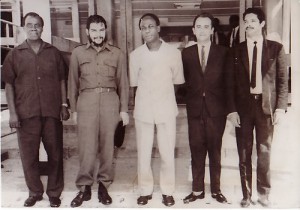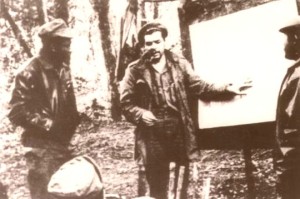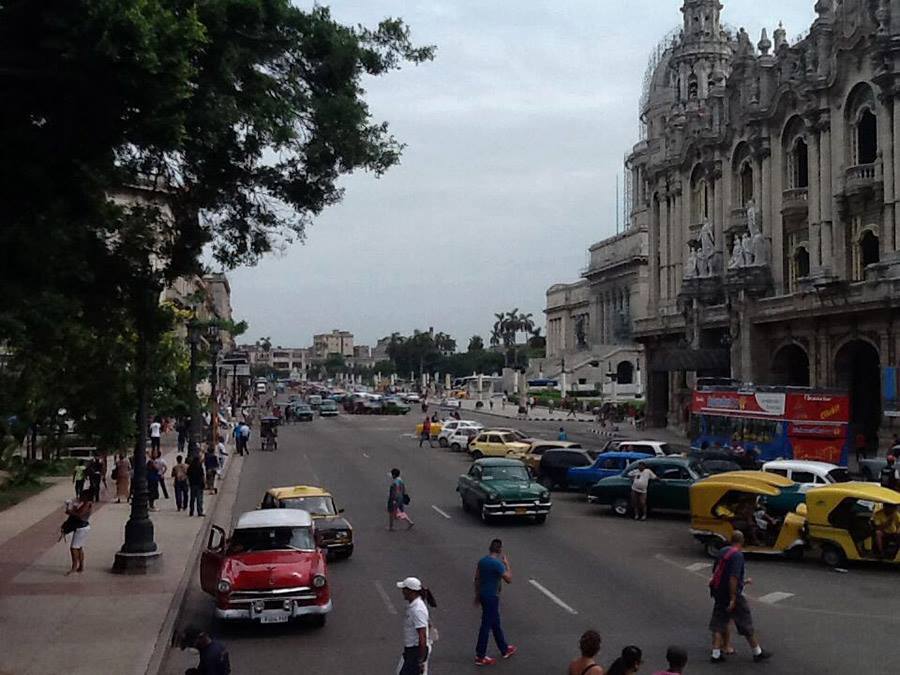EL CHE GUEVARA EN ÁFRICA: HISTORIA DE UN ENGAÑO.
Hoy es un viejo con todos los síntomas de muerte tocando a su puerta, pero Fidel Castro tiene mucho que contar cuando llegue donde estará con su “compañero” el “Che” Guevara.
Como saben los que le han conocido, el dictador cubano no tiene amigos, todo el mundo alrededor de el es considerado un prospecto de futuro traidor o al menos alguien que pudiera sabotearle su control al mando de la revolución. Cualquier acción o movimiento que hiciera nunca se le podría considerar en beneficio de algo o de alguien sino fuera en afianzar su poder. El poder que aún ante la muerte persiste en mantener. Su poder.
Durante toda su vida Fidel Castro utilizó a todos a su alrededor para cubrír con pasos medidos los episodios de sus sueños de conquista, entonces en “aras de la dictadura del proletariado” porque entonces convenia a sus intereses. La URSS estaba lejos y él podía maniobrar con los viejos bonzos y organizados seguidores de la doctrina comunista en el ámbito nacional, al mismo tiempo que ganaba tiempo.
QUE HACER CON EL CHE ?
Al triunfo de su revolución en 1959 Fidel Castro necesitaba entretener al “Che”, aquel audaz ideólogo, a quien movió de un lugar a otro dentro del país para más tarde “convencerlo” de la necesidad de muchos Vietnams alrededor el mundo; para entretener a sus enemigos internacionales, asegurandole que él sería el Jefe absoluto de todos los logros revolucionarios. Fidel Castro sabía que el argentino chocaría tarde o temprano con el por la diferencia de sus culturas y ambiciones.
Era el momento de quitárselo de encima. Así es que lo convence para lanzarlo a nuevas conquistas, cosa que fué fácil en ese terreno fértil de las ambiciones personales de su antiguo compañero revolucionario. El Che nunca comprendió que Fidel fácilmente aparentaría tener todos los medios necesarios en el extranjero para ayudar en esos fantásticos planes “de liberación” y entonces cortar estos la ayuda prometida para que “las oligarquías” se ocuparan del ilusionado argentino. Un plan magistral donde Castro tenía todas las de ganar.
GUEVARA EN AFRICA
Guevara viaja al Africa el 19 de Abril de 1965 para apoyar al Movimiento marxista Simba que aprovecha los problemas internos del Congo y que dirige Laurent Kabila; viaja con el nombre de Ramón Benitez acompañado del Capt. Cubano negro Victor Dreke y otros 100 afro-cubanos. Desde su llegada observa como los principales de los considerados líderes africanos de liberación pasan el tiempo en lugares de esparcimientos y lupanares en las ciudades, todos ajenos de la lucha que el Che y el resto de los cubanos vienen a integrar. Su estancia en Africa dura varios meses y es uno de los más fuertes golpes que “Che” recibe en su ilusión ante la realidad que ve allí. Sin darse cuenta de la trama de esta sangrienta novela que Fidel Castro ha tramado, El Che se comunica con éste tratando de explicarle que “les han vendido un tranvía de grandes dimensiones”…que allí la realidad es otra. En vez de las legiones de revolucionarios africanos dispuestos a seguirlo, sólo existen bandas desconectadas que sobreviven en la selva, todo lo pierden sin combatir, sobran hombres armados y faltan soldados y “no podemos liberar solos a un país que no quiere luchar”. Como el comprueba y reconoce en este lugar elegido para sacudir la modorra africana, tampoco hay hambre de tierra, una de las bases ideológicas del dogmatismo de entonces.
Guevara se critica a el mismo por haber tomado sus propias fantasías revolucionarias como datos reales, está indignado con su propia ligereza para embarcarse en la aventura del Congo conociendo tan poco sobre la profundidad del problema.
Este realismo al que es empujado sin contemplaciones se pierde, sin embargo, en el siguiente capítulo de la vida del Che, cuando se internará para morir en una Bolivia que creía conocer.
Todo se veía tan bien en el papel. Sin embargo, el congoleño considera ser transporte de cargas pesadas como por debajo de su dignidad y se desvía, aburrido, cuando los cubanos tratan de hacer una emboscada al enemigo en ese escenario. Para los supersticiosos guerrilleros africanos cualquier acción tiene que ser apoyado en “Dawa” y pociones mágicas, fomentada por los brujos para la victoria, vaciando entonces sus cargadores en el cielo con los ojos cerrados. Peor aún, ”cada uno de nuestros combatientes habían presenciado con tristeza tropas de asalto que se desvanecen en el momento del combate y tiran sus armas preciosas para huír más rápidamente”, registra Guevara. Sus líderes sobrepasan y eclipsan a los soldados de a pie por estos defectos. Laurent Kabila, el jefe de la revuelta rara vez se dignó a visitar el frente. Y Guevara, protegido de la lluvia torrencial en chozas infestadas de piojos, plagado por la malaria y la disentería, recibe informes de borracheras de Kabila en Dar es Salaam.
Dentro de siete meses de la revolución esta se convirtió en una derrota.
EL FINAL
Sin embargo, Guevara es demasiado inteligente para poner toda la culpa a los congoleños. Los cubanos, confiesa, eran demasiado confiados (?) y cometieron errores de aficionado. Llegaron todos mal informado, se espera que estén operando en terreno plano, no montañas. El único traductor de Swahili, el idioma local, es un niño de corta edad, Freddy Ilanga que con el tiempo se salva de la muerte al poder huir con Guevara para Cuba donde aún hoy vive sin poder regresar a su tierra y su familia. La pobre opinion del Che sobre el dirigente congoleño Kabila lo representa en una nota al gobierno de Cuba donde dice “nada me llega a convencer que Kabila es el dirigente en este momento de Africa”.
Todavía el Che Guevara no ha reconocido la habilidad de quien lo ha mandado allí y lo que se esconde detrás de éste secreto que nunca supo o no quiso comprender y que en repetición (Bolivia) lo lleva más tarde a su muerte.
En aquel momento mercenarios sudafricanos, junto con operativos cubanos exilados llevados allí por la CIA trabajan junto a las Fuerzas Nacionales del Congo para perseguir a Guevara y su grupo. En una ocasión lo arrinconan cerca de la villa de Fizi en el Lago Tanganika al monitorizar las comunicaciones de los cubanos donde se pueden descubrir con antelación sus planes. Las transmisiones son interceptadas desde un barco de los Estados Unidos, el USNS Private José F. Valdéz (T-AG-169) anclado frente a Dar Es Salaam en el Océano Indico.
Ya para Noviembre 20, 1965, enfermo con disentería, sufriendo de fuertes ataques de asma y descorazonado con los siete meses de frustración Guevara deja el Congo con los cubanos sobrevivientes, seis de los originales 12 que habian llegado con Victor Dreke habian muerto, y se aferra a la idea de huír cuando dice “es mejor retirarse que morír allí sabiendo los lideres son corruptos; no se puede liberar una nación que no quieren luchar” repite una y otra vez. El elemento humano ha fallado y termina diciendo “Esta es la historia de un Fracaso”.
Despues de varios meses en recorrido por el extranjero y embajadas cubanas en el exterior, llega Guevara a Cuba de incognito, solo para estar con su familia, sin Fidel Castro darlo a conocer públicamente.
Solo en el discurso del Primero de Mayo de 1967 en Cuba el Comandante Juan Almeida, entonces Ministro de las Fuerzas Armadas Cubanas dá a conocer que el “Che” Guevara estaba “sirviendo a la revolución en algún lugar de Latinoamérica”…
Su suerte estaba sellada.
Arnoldo Varona/InternetPhotos/www.TheCubanHistory.com
The Cuban History, Hollywood
Arnoldo Varona, Editor.
CHE GUEVARA IN AFRICA: A DECEPTION STORY.
Today is an old man with all the symptoms of death knocking at his door, but Fidel Castro has much to say when he gets where his “compañero” el”Che” Guevara is.
As is known to those who have known him, the Cuban dictator has no friends, everyone around him is considered a prospect for a future traitor or at least someone who would sabotage his control at the helm of the revolution. Any action or movement that he ever did it will be something for his benefit was to entrench their power. The power that even near his death continues to maintain. His power.
All his life Fidel Castro have used everyone around him, with measured steps, to cover episodes of his dreams of conquest, then in “the interests of the dictatorship of the proletariat” because then it suited their interests. The USSR was far and could maneuver with the old organized comrades and followers of the Communist doctrine in the national sphere, while buying time.
WHAT TO DO WITH EL CHE?
The triumph of his revolution in 1959 Fidel Castro needed to entertain the “Che”, that bold ideologue, who moved from one place to another within the country for later “convince” him the need for many Vietnams around the world to entertain international enemies, assuring that he would be the absolute head of all the revolutionary gains. Fidel Castro knew that sooner or later the Argentine will clash with him because the difference of culture and ambition.
It was the time to get rid of him. So persuaded him to launch a new conquests, which was easy in the fertile ground of the personal ambitions of his old revolutionary comrade. Che never realized that Fidel would make him to believe he had all the necessary facilities abroad to help these fantastic plans “release” and then cut these aid promised an then let the old “oligarchies” take care of him. A master plan where Castro had everything to gain.
Guevara traveled to Africa on April 19, 1965 to support the Marxist Simba movement that leverages the Congo’s internal problems and directs Laurent Kabila, traveling under the name of Ramon Benitez accompanied by Capt. Victor Dreke black Cuban and 100 Afro-Cubans. Since his arrival seen as the chief of the African liberation leaders considered spending time in places of entertainments and brothels in the cities, all outside of the struggle that Che and other Cuban come to integrate. His stay in Africa over several months and is one of the strongest blows “Che” receives its illusion to the reality he sees there. Unaware of the plot of this novel bloody Fidel Castro has hatched, Che communicates with it trying to explain that “we have sold a large tram” … that there is another reality. Instead of the legions of African revolutionaries willing to follow, there are only disconnected bands that survive in the jungle, lost everything without fighting gunmen left over missing soldiers and “alone can not liberate a country that does not want to fight.” As the checks and recognizes in this place chose to shake the torpor Africa, there is no hunger for land, one of the ideological foundations of dogmatism then.
Guevara criticized it for taking their own revolutionary fantasies as real data, is disgusted with his own lightness to embark on the adventure of Congo knowing so little about the depth of the problem.
This realism is pushed unceremoniously lost, however, in the next chapter in the life of Che, when an intern to die in Bolivia I thought I knew.
Everything looked so good on paper. However, the Congolese considered to be carrying heavy loads such as beneath their dignity and turns away, bored, when Cubans trying to ambush the enemy in that scenario. For the superstitious African guerrillas any action must be supported by “Dawa” and magic potions, encouraged by sorcerers to victory, then removed his boots in the sky with eyes closed. Worse, “each of our fighters had sadly witnessed assault troops that vanish at the time of the fight and throw their precious weapons to flee quickly,” Guevara recorded. Outweigh and overshadow their leaders to foot soldiers for these defects. Laurent Kabila, the leader of the revolt rarely deigned to visit the front. And Guevara, protected from rain in shacks infested with lice, infested by malaria and dysentery, receives reports of drunkenness Kabila in Dar es Salaam.
Within seven months of the revolution that turned into a rout.
THE END
However, Guevara is too smart to put all the blame on the Congolese. The Cubans, he admits, were too confident (?) And amateur mistakes. They all misinformed, are expected to be operating on flat ground, not only montañas.El Swahili translator, the local language, is a young child, Freddy Ilanga that eventually saved from death to flee with Guevara to Cuba where he lives still unable to return to his homeland and his family. The poor opinion of Che on the Congolese leader Kabila is represented in a note to the government of Cuba where it says “nothing comes to convince me that Kabila is the leader at this point in Africa.”
Che Guevara still has not recognized the ability of who sent it there and what lies behind this secret he never knew or wanted to understand and which repeat (Bolivia) takes him to his death later.
At that time South African mercenaries, operating with Cuban exiles brought there by the CIA working with the National Forces of Congo to hunt Guevara and his group. I once cornered him near the town of Fizi on Lake Tanganyika to monitor communications of Cubans where you can discover in advance their plans. The transmissions are intercepted from a U.S. ship, the USNS Private Joseph F. Valdez (T-AG-169) anchored off Dar Es Salaam on the Indian Ocean.
As early as November 20, 1965, sick with dysentery, suffering from severe asthma attacks and disheartened with the seven months of frustration Guevara left the Congo with the Cuban survivors, six of the original 12 who had arrived with Victor Dreke had died, and clings to the idea to run away when he says “it is better to leave to die there knowing the leaders are corrupt, can not free a nation unwilling to fight” over and over again. The human element has failed and ends by saying “This is the story of a failure.”
After several months in travel abroad and Cuban embassies abroad to Cuba Guevara arrives incognito, just to be with their families without Fidel Castro to make it known publicly.
Only in the speech of May 1967 in Cuba Commander Juan Almeida, then Minister of the Cuban Armed Forces disclosed that the “Che” Guevara was “serving the revolution somewhere in Latin America” …
His fate was sealed.
Arnoldo Varona/InternetPhotos/www.TheCubanHistory.com
The Cuban History, Hollywood.
Arnoldo Varona, Editor.



 CHÉ GUEVARA in África. A Deception Story. + El Ché Guevara en África. Historia de un Engaño.
CHÉ GUEVARA in África. A Deception Story. + El Ché Guevara en África. Historia de un Engaño.



